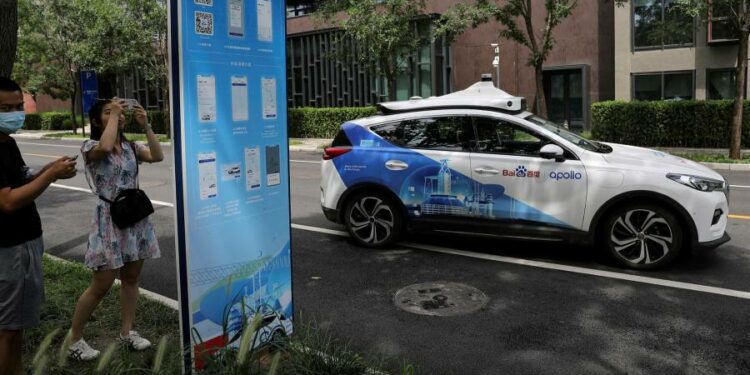Chinese regulators have given the green light to more robotaxis operated by online search company Baidu and Toyota-backed Pony.ai in Beijing. A safety supervisor must sit in the car — unlike in California which has granted licenses for fully autonomous cars — but does not need to be behind the wheel as in previous trials.
The 14 cars will be allowed to traverse a 60-sq km zone in the Yizhuang district of the capital from Thursday, as Beijing follows smaller Chinese cities in approving robotaxis.
The decision to grant robotaxi licenses to Baidu and Pony.ai reflects Beijing’s preference for nurturing advanced technology and hardware businesses over ecommerce companies that the government has accused of amassing monopolistic power, said analysts.
Baidu, listed on Nasdaq and in Hong Kong, has been caught in Chinese president Xi Jinping’s “common prosperity” crackdown on industries such as education and gaming, which have hit the company’s advertising business. Baidu has targeted autonomous vehicles as a potential source of future revenues.
“This regulatory approval [from Beijing] marks a significant milestone for the autonomous ride-hailing industry in China, indicating a regulatory openness to taking a further step toward a fully driverless mobility future,” Baidu said in a statement.
Pony.ai, jointly based in China and Silicon Valley, has said the move marked the transition in China from testing autonomous vehicles to allowing public passengers to ride driverless robotaxis.
Charlie Chai, who covers autonomous vehicles at 86Research, said Beijing was broadly supportive of the sector as improving efficiency and advancing technology.
“The policy for encouraging robotaxis is very consistent,” Chai said. “Beijing wants more hard tech and advanced technologies versus what the government perceived as internet giants creating monopolies.”
Baidu has partnered with state-owned automaker BAIC Group to offer an autonomous driving operating system called Apollo. Pony.ai offers a rival virtual driver technology and was awarded approval from the southern city of Guangzhou to operate robotaxis earlier this week.
Chai said, however, that commercialisation of the nascent industry was still far away as it was currently costing driverless companies more money to carry passengers than normal taxis and ride-hailing services.
Still, he said the potential for growth was significant. “There are around 3mn vehicles for hire in total in China and theoretically all can be replaced by unmanned vehicles so the market opportunity is huge,” Chai added.











